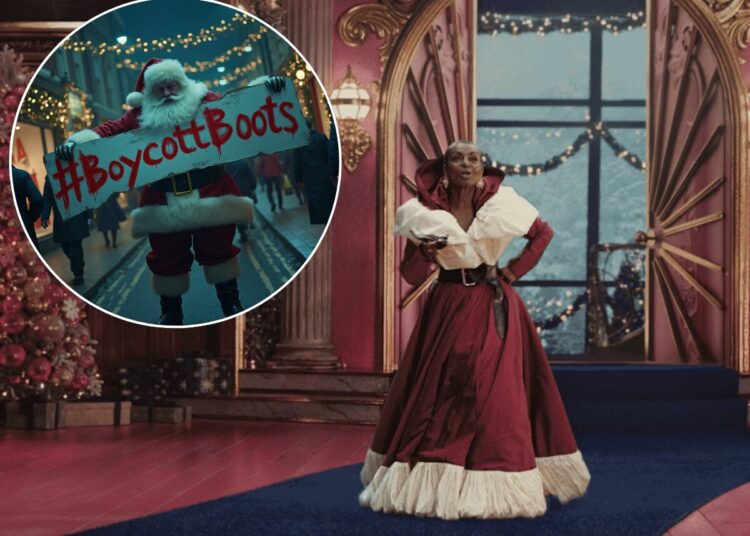This year’s Boots Christmas ad has dared to offer a fresh, inclusive take on a tradition many of us know all too well: the reality that, behind the merry magic, Christmas is powered by the unacknowledged work of women. But to absolutely no one’s surprise, this heartwarming portrayal has somehow “offended” certain loud, familiar voices, who predictably accused Boots of being “woke” for the ad’s diversity and its celebration of Mrs. Claus as a Black woman leading the charge.
Here’s the thing: a certain crowd now uses “woke” to vilify anything that isn’t made exclusively for them, and it’s honestly gotten a bit embarrassing. As if inclusivity—the simple act of acknowledging that queer people, people of colour, and nonbinary individuals exist and celebrate holidays too—is a revolutionary threat to “tradition.”
In the ad, actress Adjoa Andoh steps in as Mrs. Claus. When Santa snoozes by the fire, she’s the one mobilising her team of “elfluencers” to make the season’s magic happen, with a cast of characters that reflect the real world—queer folks, drag queens, people of colour, and everyday women and men. But for the predictable bigots and self-proclaimed “anti-wokes,” this lineup was enough to send them spiralling into full-blown fury – and we’re somehow the snowflakes? Yeah..um..okay?
As Katie Edwards aptly noted in The Independent, holiday adverts today are great Rorschach tests for bigotry. Somehow, ads that merely reflect the diversity of today’s Britain enrage a faction that demands an exclusive narrative of Christmas that belongs only to them. The Boots ad, with its inclusive cast, has spurred an outpouring of “how dare they?” posts on social media, even leading far-right group Britain First to launch a petition to #BoycottBoots. These critics rage that Boots has chosen to “promote” diversity—framing mere representation as an “attack” on their culture.
The bitter irony of all this? The loudest voices threatening a boycott will hardly make a dent in Boots’ business. Let’s be honest, the crusty old white men vowing to stop shopping at Boots are probably shopping for a 7-in-1 shower gel once a month, at best. I imagine Superdrug will see a slight uptick in their sales of multi-purpose body wash, while Boots will carry on without a hitch. Who am I kidding? Once an unwashed ass, always an unwashed ass.
First thing’s first, these objections aren’t about “protecting tradition.” It’s about white fragility and the refusal to accept a more inclusive view of what Christmas actually looks like for millions. They can’t bear to see Mrs. Claus portrayed by a Black actress or watch an ad that’s designed to speak to a broader, more socially aware audience.
What these critics truly seem to fear is the exposure of their outdated narrative—one that excludes anyone who isn’t white, straight, and performing a 1950s-style Christmas. And they’re furious that Boots has pointed out that in countless households, Christmas happens because of women’s invisible labour.
According to YouGov, a staggering 69% of women say they’re the ones sending out the Christmas cards, while only 12% of men claim to do the same. The numbers aren’t much better when it comes to other holiday tasks: gift buying is split 61% to 8% female-to-male, food shopping lands at 54% to 13%, and cooking Christmas dinner is a whopping 81% of women compared to just 19% of men. So when my team flagged the uproar over this ad, I jumped on YouTube, ready to see what could have possibly rattled so many. But as I watched, all I could think was, Hell yeah.
The ad closes with Adjoa Andoh giving a knowing look to the camera, just as Santa wakes up to claim credit after she and her “elfluencers” have done the heavy lifting. “What?” she says with a sly smile. “You thought it was all him?” I couldn’t help but grin and applaud Boots for finally giving women credit for all that behind-the-scenes holiday magic. It’s like the ad turned to women everywhere and said, We see you. Thanks for all the hard work—you’re the ones who make Christmas magic.
The reactions to the Boots ad feel like a desperate attempt to cling to a past that most of us have well outgrown. Right-wing commentators argue that an ad like this “takes the piss out of Christmas.” The so-called “controversial” elements of this ad are ordinary parts of the modern holiday season. Meanwhile, the entire rant about how the ad “threatens traditional family values” doesn’t hold up to any level of scrutiny. The level of dimwittedness coming from the far-right on this truly astounds me.
In truth, this ad is a refreshing acknowledgement of something that’s long been swept under the rug: holiday labour, in all its forms, has traditionally been women’s work. Andoh’s Mrs. Claus doesn’t just “fill in” for Santa—she is Santa. She embodies the reality that for generations, women have done the invisible, unglamorous work that makes Christmas possible. It’s a reality many people can relate to, and it’s about time it was recognised.
Each year, we seem to repeat this exhausting cycle. Ads that reflect our diverse world get branded as “woke” by those who want to pretend the world hasn’t changed (let’s not forget the reaction to the 2020 Sainsbury’s festive ad, that portrayed a Black British family celebrating their love for each other at Christmas. Or the homophobic reactions to Norway’s state-run Posten postal service ad in 2021, which features a – *gasps* – gay Santa). But this outrage no longer holds the power it used to; it’s losing relevance as people become more aware of the importance of representation. 99% of the responses I have seen to this ad online have been overwhelmingly positive. So sorry fascists, you’ve lost this one.

To Boots: well done. This ad reminds us that Christmas isn’t a homogenous, one-size-fits-all celebration. It’s as diverse as the people who celebrate it, and acknowledging this doesn’t ruin Christmas; it makes it richer.
So let the old white men and TERF keyboard warriors scream #boycottboots all they want. Their fuss changes nothing, and if anything, it’s only bringing more attention to an ad that celebrates the real, diverse, hardworking heart of Christmas. And really—what’s more festive than that?













A typical UK Christmas is a religious holiday (shaped by Dickens) and nothing to do with how people are offended. Traditions constantly change anyway. I really couldn’t care less about what people do or how they live so long as they are peaceful.
Once again the blatant left-wing hypocrisy rears its ugly head. One minute talking about how evil racism and sexism are and the next minute dropping statements like “the crusty old white men” which manages to be racist, sexist and ageist but because it’s against the only group you can still slag off, of course it doesnt count.
Wow this is a big serving of homophobia.
Diverse? Discriminatory.
It’s great that women and minorities are recognised in the advert, but why was Santa portrayed as lazy? Promoting one against another is what caused the upset in the advert just as much as it would have if it was the other way around. Truly inclusivity should showcase all which unfortunately isn’t the case in this advert.